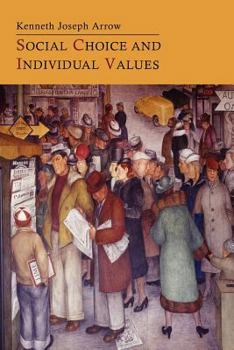Social Choice and Individual Values (Cowles Foundation Monographs Series)
Select Format
Select Condition 
Book Overview
Originally published in 1951, Social Choice and Individual Values introduced "Arrow's Impossibility Theorem" and founded the field of social choice theory in economics and political science. This new... This description may be from another edition of this product.
Format:Paperback
Language:English
ISBN:1614273456
ISBN13:9781614273455
Release Date:September 2012
Publisher:Martino Fine Books
Length:110 Pages
Weight:1.54 lbs.
Dimensions:0.3" x 6.0" x 9.0"
Customer Reviews
5 ratings
Fantastic
Published by Thriftbooks.com User , 15 years ago
Fantastic and a classic book. And the store send it very fast, considering the shipment to Brazil.
If you want to understand a basic logic about collective choice......
Published by Thriftbooks.com User , 17 years ago
As already well known, this book is one of the great books beyond economic scholar area. In particular, this book give us an appropriate answer "what is rational choice in collective choice?(even Arrow's word, social choice)". Arrow firstly proposes "paradox of voting", which is incompatibility of individual choice in one subset as pre-definition. This is to say, paradox of between "individual choice and collective one". And then he dissects "alterantive" in one subset as choice definition. The arternative is based on several axims and conditions about preference and ordering in propositions of well-fare social choice. This book however cannot be considered as very readable one because you need strong conceivable ability and tolerable endurance to understand his all propostions, but must read it for further studies regarding collective choice. That is to say, if you want to understand collective choice theory, this book give you so important and basic several definitions and propositions including mathematic knowledge. Despite hard to way, but absolutely need to way!
Insightful
Published by Thriftbooks.com User , 18 years ago
Kenneth Arrow's work in game theory was developed to undermine Robert's Rules of Order. Robert's Rules have been a model for voting for some time now, and the search for a flaw in that model was the original impetus for game theory in general. Game theory is part mathematical and economic in its method. Its mathematics is largely first order logic with algebraic properties. In this short book, Arrow uses the algebraic property of transitivity to show a flaw in the voting system. Although it seems a majority prefer x to y, when the ballets are handed in, the collective result is that people prefer y to x. Arrow's theorem follows Kurt Godel's incompleteness theorem to show the incompleteness of a voting model. As a corollary, it does show how one can undermine the legislative process if one pays attention to the details. It can also be insightful for how to manipulate the voting process. In several recent elections, where both Democrats and Republicans gained seats in Congress and as Governors, the order of implementing a recount and the method of counting operated to beat an opponent. Unfortunately, lawyers in the respective cases who were counsel to the losing party were not familiar with Arrow's theorem.
Great book, but probably not the same one Garrett read
Published by Thriftbooks.com User , 25 years ago
I usually only write reviews here about inexpensive math textbooks, but when I saw the other review, I had to add my two cents. This book is a great work of scholarship about the theory of voting and social choice, fields which this book(in its original form as Arrow's PhD thesis created). It is a totally theoretical work, which does not espouse anything about how one should live, contrary to what the other reviewer says. Very certainly, it says nothing about conformity. In a certain very tenuous sense, one could say that the conclusions favor the individual over society, but the work makes no value judgements that kind. The theory of social choice is concerned with the logical problem of defining what it would mean to say that 'society prefers x to y'. More concretely, given a set of abstract individuals, each with their own set of values, how can we put these individual values together to determine what "society" wants. In particular, this theory clearly has relevance to voting, but it is abstract and has wider relevance as well. Arrow shows in this work that a few very reasonable assumptions about how these social values should behave in relation to the individual values are in fact contradictory(provided one has more than three people in the population-with two good old democracy works perfectly), forcing one to conclude that perhaps the concept of social choice is meaningless. So he proves that an informal concept of social choice is contradictory, but that doesn't mean that if one takes weaker axioms, you can't get a consistent concept, and he studies this question, a topic of much further research, in the later chapters. One thing to note is that Arrow's original proof was in fact fallacious, but in this book he provides a fix. So, it can be tempting to read this work as being opposed to the idea that a society itself can have values, and thus individualism is all, but this was not at all the spirit in which the book was written, which is the spirit of mathematics(though no mathematics is used) and of welfare economics(which is not about welfare in the sense of a government giving money to the poor).
A brilliant attack on sycophancy in support of individuality
Published by Thriftbooks.com User , 25 years ago
This book espouses intransigent individuality while refuting blind conformity to societal norms.. . .A great work!





